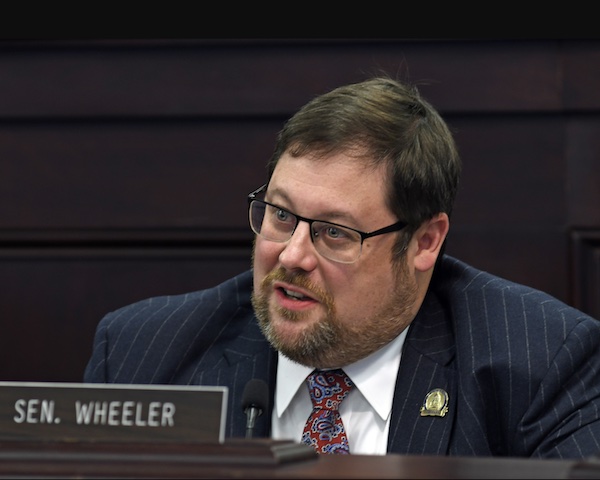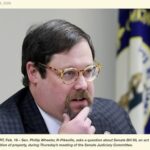
SENATOR PHILLIP WHEELER’S LEGISLATIVE UPDATE
Standing together in times of crisis

Like many Eastern Kentuckians, Saturday, February 15, 2025 is a day that I will never forget. My wife Crystal and I went to check on my law office about 11 pm and saw the Levisa Fork of the Big Sandy creeping ever closer to our basement storage area where file representing hundreds of clients and the last 20 years of my law practice were stored. We worked for the next three hours frantically stacking the crates on higher shelves before receiving a message from a friend at 3:00 am telling us that they were about to close US 23 and that we had better leave if we wanted to have any chance of making it home. We grabbed our computer server and left the building only to see a large portion of the Weddington Plaza shopping center submerged under several feet of muddy water and the river half way over the roadway as we approached the Walmart intersection.
Since moving to Pike County at the age of seven in 1985, I had often heard stories of the 1977 and the 1957 floods, but the reality of those disasters for me and most Pike Countians under the age of 50 was old photographs and oral history. This has now inalterably changed for a generation of folks living in the 31st Senate District and other affected areas.
I began week four of the 2025 Legislative Session with a heavy heart at the thought of my many friends and neighbors across Pike County and the rest of Kentucky impacted by the severe storms and historic flooding over the past weekend. Families have lost everything, communities struggling to recover, and the road ahead will be long. But if history taught us anything, it’s that our people are resilient.
Several communities, particularly in Eastern and South-Central Kentucky, experienced widespread devastation, with homes and businesses submerged, roads washed out, and thousands left without power. At one point, there were over 300 road closures. Tragically, reports confirm that 21 lives have been lost in the flooding, and we mourn alongside the families affected.
The Governor declared a state of emergency, and President Trump has approved federal resources for assistance in recovery efforts. First responders, the National Guard, and local emergency management teams continue working tirelessly to conduct water rescues and aid those in need. Reports indicated there were hundreds of water rescues, which resulted in many lives being saved. Their dedication, and that of local neighbors, in the face of such horrors is commendable, and we are grateful for their service.
The Senate is working closely with our colleagues in the House of Representatives to coordinate support for communities impacted by the latest flooding. Lawmakers representing flood-affected districts are in daily contact with local officials to assess immediate needs and long-term recovery efforts.
In the coming days, we expect to be provided an assessment of the damage and a full account of existing emergency funding. This includes the $45 million remaining in the Eastern and Western Kentucky SAFE funds and the $50 million in immediate emergency funds already authorized by the legislature. A comprehensive understanding of available resources is critical to ensuring an effective and responsible response.
The General Assembly stands ready to take additional action as needed to further support recovery efforts and ensure our communities receive the help they need. I will continue providing updates as more information becomes available.
Legislative Update
Week four of the 2025 Legislative Session marked the bill filing deadlines for the House and Senate. In the upper chamber, the Senate Majority Caucus successfully limited the number of bills each member introduced.
This week, I filed Senate Bill (SB) 1 to establish the Kentucky Film Office within the Cabinet for Economic Development. While Kentucky has one of the strongest film incentive programs in the country, we lack the structure to fully capitalize on it. This bill creates a centralized office to market Kentucky, streamline productions, and attract more projects, helping to grow jobs and strengthen our film industry for the long term. I look forward to it moving in committee soon.
I foresee SB 1 as a vehicle for economic investment across the state, particularly in our rural areas. Why should the famous History Channel miniseries about the Hatfield-McCoy feuds be filmed in Romania rather than beautiful Eastern Kentucky where the real events took place? Why should the series “Justified” which takes place in Harlan County have to be filmed in Pennsylvania and California rather than Harlan and Lexington?
The State of Georgia, which passed film tax credits at around the same time as Kentucky, has developed a multi-billion-dollar film production industry. A 2023 study of Georgia film production data confirms the state’s film tax incentive has fueled billions in economic activity statewide — $8.55 billion in fiscal year 2022 alone; is responsible for nearly 60,000 jobs; and generates a return on investment of $6.30 for every $1 in tax incentive.
I believe that SB 1 can create a similar economic environment in Kentucky.
Below is a list of other bills the Senate approved this week.
SB 2 ensures no taxpayer dollars are used for transgender surgeries or hormone therapy for inmates while still protecting access to medically necessary care for conditions like thyroid or hormonal disorders. The bill draws a clear line between essential health care and elective procedures, which prevents state agencies from pushing unauthorized policies behind closed doors.
SB 15 exempts minor league baseball players from Kentucky’s wage-and-hour laws to align with their federal collective bargaining agreement, which provides salary increases, year-round pay, health insurance, and housing. This ensures Kentucky’s minor league teams remain operational.
SB 18 expands insurance options for vehicle dealers by allowing required bonds or coverage from a broader range of insurers, including certain non-admitted insurers. It also updates insurance statutes to streamline compliance.
SB 24 strengthens protections against insurance fraud by closing loopholes and expanding the definition of fraudulent statements in property and casualty claims. It includes repair cost misrepresentation, towing, storage, and associated expenses.
SB 28 establishes an agricultural economic development program within the Department of Agriculture to boost agribusiness, create jobs, and support rural communities. It creates a funding board to oversee financial support for agriculture projects statewide.
SB 67 proposes a constitutional amendment to freeze property tax assessments for Kentucky homeowners aged 65+ to protect them from tax increases due to rising property values. Requires voter approval in 2026.
SB 69 modernizes animal health regulations by creating new licenses for animal chiropractors and equine dental providers. It establishes an advisory committee, updates rabies vaccination record laws, and clarifies that only veterinarians can prescribe equine dental medications.
SB 77 expands eligibility for appointments to the Education Professional Standards Board by allowing the governor to appoint either a chief academic officer or the head of an educator preparation program from independent not-for-profit colleges.
SB 79 updates state personnel policies to improve efficiency and accountability. It clarifies job classifications, requires remote state employees to return to in-person work with limited telework allowances, and reclassifies wardens as non-merit employees to improve juvenile facility leadership.
I understand that many of my constituents have concerns about this issue, and I have heard their frustrations firsthand. While remote work can be beneficial in certain cases, we must also recognize the critical need for government employees to be responsive and accessible. Our citizens rely on essential services, and ensuring the highest level of accountability is paramount.
The bill is NOT FINAL at this time. As this bill moves through the legislative process, I will continue to work closely with my colleagues in the House to evaluate its impact and ensure that we address any concerns raised by those affected.
SB 84 ensures Kentucky courts interpret laws independently rather than deferring to state agencies. It mandates de novo judicial review, aligning with a recent U.S. Supreme Court ruling to prevent excessive agency authority.
SB 103: Increases transparency in the Kentucky Office of Vocational Rehabilitation by prioritizing in-state service providers, requiring annual reports to the governor, and preventing arbitrary service fees.
SB 111 strengthens Kentucky’s juvenile justice system by prioritizing mental health treatment for high-risk youth, improving facility safety, and creating a structured continuum of care for mentally ill juveniles.
SCR 43 expresses the General Assembly’s support for the Crisis Recovery Support Network, which helps schools and colleges recover from crises like natural disasters and school shootings, particularly in rural areas.
It’s a privilege to serve you in Frankfort. If you have questions or ideas, feel free to contact my office at (502)-564-8100 or email me atPhillip.Wheeler@kylegislature.gov.
# # #
Sen. Phillip Wheeler, R-Pikeville, represents Kentucky’s 31st Senate District, including Elliott, Johnson, Lawrence, Martin, and Pike Counties. Wheeler serves as chair of the Senate Economic Development, Tourism, and Labor Committee and vice chair of the Senate Judiciary Committee. He is also co-chair of the Capital Planning Advisory Board. Additionally, Wheeler is a member of the Senate Committees on Transportation, Natural Resources and Energy, and Licensing and Occupations.

















